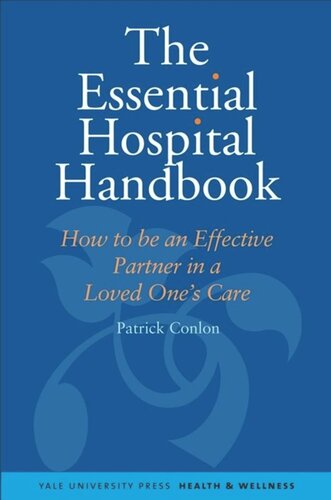

Most ebook files are in PDF format, so you can easily read them using various software such as Foxit Reader or directly on the Google Chrome browser.
Some ebook files are released by publishers in other formats such as .awz, .mobi, .epub, .fb2, etc. You may need to install specific software to read these formats on mobile/PC, such as Calibre.
Please read the tutorial at this link: https://ebookbell.com/faq
We offer FREE conversion to the popular formats you request; however, this may take some time. Therefore, right after payment, please email us, and we will try to provide the service as quickly as possible.
For some exceptional file formats or broken links (if any), please refrain from opening any disputes. Instead, email us first, and we will try to assist within a maximum of 6 hours.
EbookBell Team

4.1
10 reviewsHospitalization is often as dismaying and frightening for family members as it is for the patient. And despite a heartfelt desire to understand what is happening and to comfort a sick or injured loved one, too often relatives and friends feel helpless and marginalized by the hospital system. This valuable book is the first to assist families and friends of adult patients to navigate the unfamiliar and intimidating territory of the hospital. It spells out in the clearest terms how a family can form a partnership with medical providers to ensure the best patient care possible.
Patrick Conlon’s inspiration for the book was the sudden, frightening hospitalization of his longtime partner, Jim, and his personal struggle to develop a useful role for himself as a caregiver. Here he provides the handbook he wishes he’d had when Jim was admitted to the hospital. Conlon offers encouragement, proven strategies, and straightforward adviceall with the goal of empowering others to become successful care partners at the bedside of their loved ones.
Special features of the book:
--Simple dos and don’ts to help you help your loved one and interact with hospital professionals
--Handy tear-out checklists to fill in when consulting a surgeon, preparing for discharge, making a complaint, updating family and friends, and planning important meetings
--Definitions of hospital jargonterms, abbreviations, euphemisms, an acronyms
--Sidebars with interesting facts: Can cell phones interfere with sensitive medical equipment? Why don’t British doctors wear neckties? What’s the average length of stay in an ICU?
--Easy-to-use caregiver’s chart and diary